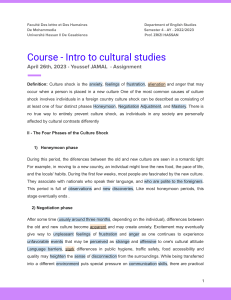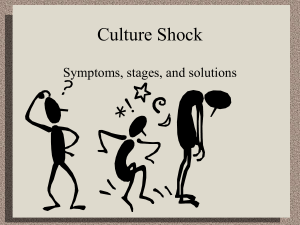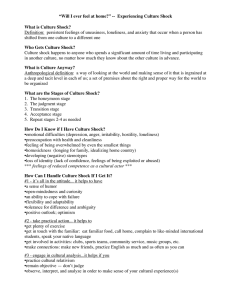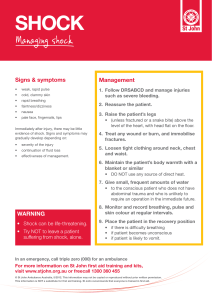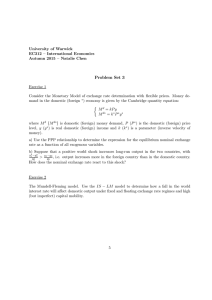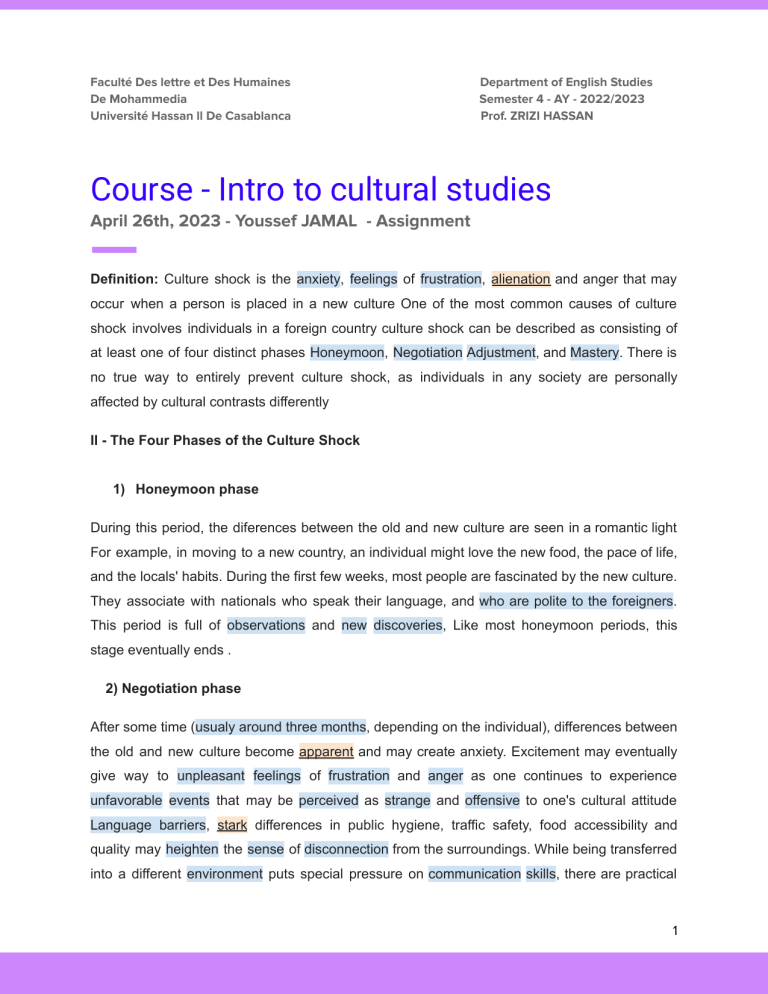
Faculté Des lettre et Des Humaines De Mohammedia Université Hassan ll De Casablanca Department of English Studies Semester 4 - AY - 2022/2023 Prof. ZRIZI HASSAN Course - Intro to cultural studies April 26th, 2023 - Youssef JAMAL - Assignment Definition: Culture shock is the anxiety, feelings of frustration, alienation and anger that may occur when a person is placed in a new culture One of the most common causes of culture shock involves individuals in a foreign country culture shock can be described as consisting of at least one of four distinct phases Honeymoon, Negotiation Adjustment, and Mastery. There is no true way to entirely prevent culture shock, as individuals in any society are personally affected by cultural contrasts differently Il - The Four Phases of the Culture Shock 1) Honeymoon phase During this period, the diferences between the old and new culture are seen in a romantic light For example, in moving to a new country, an individual might love the new food, the pace of life, and the locals' habits. During the first few weeks, most people are fascinated by the new culture. They associate with nationals who speak their language, and who are polite to the foreigners. This period is full of observations and new discoveries, Like most honeymoon periods, this stage eventually ends . 2) Negotiation phase After some time (usualy around three months, depending on the individual), differences between the old and new culture become apparent and may create anxiety. Excitement may eventually give way to unpleasant feelings of frustration and anger as one continues to experience unfavorable events that may be perceived as strange and offensive to one's cultural attitude Language barriers, stark differences in public hygiene, traffic safety, food accessibility and quality may heighten the sense of disconnection from the surroundings. While being transferred into a different environment puts special pressure on communication skills, there are practical 1 difficulties to overcome, such as circadian rhythm disruption that often leads to insomnia and daylight drowsiness, adaptation to different bacteria levels and concentrations in food and water; difficulty in seeking treatment for illness as medicines may have different names from the native country's and the same might be hard to recognize. Still, the most important change in the period is communication: People adjusting to a new culture often feel lonely and homesick because they are not yet used to the new environment and meet people with whom they are not familiar every day The language barrier may become a major obstacle in creating new relationships In the case of students studying abroad, some develop additional symptoms of loneliness that ultimately affect their lifestyles as a whole. Due to the strain of living in a different country without parental support, international students often feel pressure while adjusting to new cultures--even more so when the cultural distances are wide, as patterns of logic and speech are different and a special emphasis is put on rhetoric. 3) Adjustment phase Again, after some time (usually 6 to 12 months), one grows accustomed to the new culture and develops routines. One knows what to expect in most situations and the host country no longer feels all that new. One becomes concerned with basic living again, and things become more "normal’’ One starts to develop problem-solving skills for dealing with the culture and begins to accept the culture's positive attitude. The culture begins to make sense, and negative reactions and ways with responses to the culture are reduced. 4) Mastery phase In the mastery stage assignees are able to participate fully and comfortably in the host culture. Mastery does not mean total conversion; people often keep many traits from their earlier culture, such as accents and languages. It is often referred to as the biculturalism stage. II- Example of Culture shock (an American Visited Taiwan) Welcome to your new country. You're come here for fun, excitement, change, challenge, and perhaps money. Will the locals speak your language? I'm not trying to scare you, but perhaps they won't. Will some people there speak your language, oh most definitely? This is only one of the things that you may have to think about when you plan on going to a new country. 2 Culture shock is an interesting phenomenon that doesn't affect everyone the same way. Some just can't understand it when the locals don't speak English. Some can't comprehend why there aren't any Why am I even English signs anywhere to be found. Why are things done this way, and not that in this situation? It would never happen in my home country. Questions like these can cause people to get stressed out and want to go back to their own countries. People can get frustrated when faced with change. Many people deal with it their own way, head back home. In 1998, I travelled to Taiwan. I never once felt that I suffered from culture shock, personally. I always, felt it was more like culture fascination rather than culture shock. I was amazed with everything that I saw and encountered. But I still had many questions. For instance, why aren't there English street signs on the corner of every intersection? I felt that they would be very helpful for me and also for other people from English speaking countries. What I didn't think about was that the people that live there can read the signs just fine, and it certainly isn't necessary for them to change them all just for me. A friend of mine had a girlfriend that hated everything about Taiwan and couldn't understand why it was different from her home in San Francisco She hated the people hated the food hated the smells, hated the transportation, all because it was different from San Francisco. I asked her if she hated everything so much, why doesn't she just leave. I cared about Taiwan and its people and to be completely honest, I didn't want to hear any more of her complaining. She ended up leaving eventually, but after more complaints. This is what happens to some people, they can't adjust to their new environment properly. Others suffer from a much more realistic and understandable reason, homesickness. It's easy to miss your family, your friends, and your familiar stomping grounds For people that decide to go overseas, they have to stay focused enjoy themselves, and be strong Yes, this new place isn't like home Yes, this new place is strange and different. No, your friends and family aren't here. This was one of the biggest challenges that I had ever faced and I thrived on it Another factor involved can be diet. The foods that you're used to eating may not be available in this new location. You may have to actually try something different Believe me this is a good thing Trying new things will also be a test for you. Try the food that the locals eat everyday It's 3 obviously not bad for you or these people wouldn't be eating it themselves I have to laugh to myself when I hear about people going to Taiwan and eating McDonald's all the time. The culture in your new destination will obviously be different when compared to where you're from Things they say and do will most likely also be different. When I was in Taiwan it was generally accepted for people to ask others how much money they made In Canada this is just an awkward question that is rarely asked, even amongst close friends. Actually, now that I think back to that time. I felt uncomfortable every single time I was asked my rate of pay. I was asked quite frequently and I never actually gave up that information to my inquisitors. As I mentioned previously, culture shock affects different people different ways. I know a guy who went to Taiwan, he was originally planning on staying for a year He lasted 5 days In my opinion this small amount of time is not enough to give a fair evaluation of the country But that's me and that was his decision, not mine I just goes to show you that people are different. Don't be worried about how culture shock is going to affect you just buy a book and read a bit about your destination. Nothing will totally prepare you for what you are about to discover Enjoy yourself and make the absolute most of your experience Don't fear culture e shock embrace it. 4
